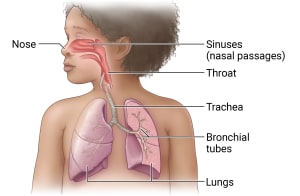Cystic Fibrosis and the Respiratory System
How does cystic fibrosis affect the respiratory system?

Cystic fibrosis (CF) is an inherited disease. It causes problems in the body's cells that make salt, water, and mucus. There is no cure for CF. It is a disease that gets worse over time. In recent decades, new medicines have been developed. And treatment of respiratory infections and other problems has improved. These things have increased the life expectancy of people with CF.
CF causes thick mucus to build up and clog certain parts of the body, such as the lungs. The buildup is caused by an abnormal gene called cystic fibrosis transmembrane conductance regulator (CFTR). CFTR controls the flow of water and salt in and out of the body's cells. Changes cause mucus to become thickened and sticky. This first affects the small airways in the lungs. Over time, it can affect all airways.
Children with CF may have lung infections. This is because bacteria that are normally cleared from the lungs stay in the thickened mucus. Many of these lung infections are long-term (chronic).
Children with CF also can have problems in their upper respiratory tract. They can have nasal polyps. These are small growths of tissue from the lining of the nose. They go into the air-filled space above and behind the nose (nasal cavity). Nasal polyps are not cancerous, but they can cause sinus problems. Sometimes these polyps must be taken out by a doctor. Children with CF also often have sinus infections.
CF affects the respiratory system. So a child with CF may have symptoms such as:
-
Chronic cough.
-
Coughing up blood.
-
Collapsed lung.
-
A rounding and enlargement of the tips of the fingers and toes (clubbing).
-
Frequent lung infections with thick phlegm.
-
Heart enlargement.
-
Nasal polyps.
-
Shortness of breath.
-
Inflamed nasal sinuses (sinusitis).
Online Medical Reviewer:
Hailey Gupta
Online Medical Reviewer:
Jessica Gotwals RN BSN MPH
Date Last Reviewed:
9/1/2025
© 2000-2025 The StayWell Company, LLC. All rights reserved. This information is not intended as a substitute for professional medical care. Always follow your healthcare professional's instructions.